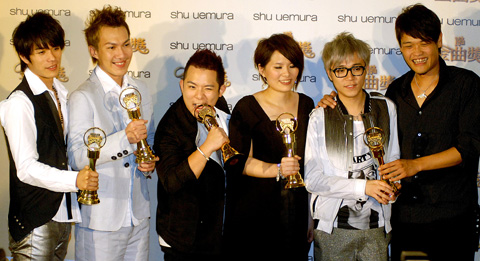In an evening that saw the comeback of big-name stars, Jay Chou (周杰倫) triumphed, picking up the Best Composer and Best Song awards for the single Blue and White Porcelain (青花瓷), which also won his long-term partner Vincent Fang (方文山) the title of Best Lyricist. Even Chou's music work for his directorial debut Secret (不能說的秘密) won big in the usually overlooked instrumental music categories, grabbing top honors in Best Composer and Best Album Producer sections.
The biggest surprise of the night was Karen Mok, who walked home with the Best Mandarin Album award.
The 19th Golden Melody Awards (第十 九屆金曲獎) took place at Taipei Arena (台北巨蛋) last night, with pop music awards handed out in a total of 23 categories chosen from among more than 100 nominees by a 33-member panel of judges after four rounds of jury meetings.

PHOTO: AFP AND TAIPEI TIMES
The nominees in this year's pop music categories contained many familiar faces. Jay Chou (周杰倫) garnered the most nominations including Best Song, Best Mandarin Album, Best Composer and Best Lyricist. Tanya Chua (蔡健雅) was another strong contender with seven nominations, followed by folk-rock band Sodagreen (蘇打綠) with six.
The coveted Best Band award went to last year's titleholder Sodagreen (蘇打綠), beating out all-girl rock band Cheery Boom (櫻桃幫) and the more experimental Hakka hip-hop outfit Kou Chou Ching (拷秋勤).
In the hotly contested Best Mandarin Female Singer category, Tanya Chua (蔡健雅) beat out strong contenders A-mei (張惠妹), Stefanie Sun (孫燕姿) and Fish Leong (梁靜茹) to walk away with the trophy. The Best Mandarin Male Singer went to Gary Tsao (曹格) from Malaysia.

PHOTO: AFP AND TAIPEI TIMES
Despite the large number of nominations for his album On the Run (我很忙), Chou did not attend the ceremony. The Chairman was busy touring China instead.
Among the best-dressed stars were members of pop-rock band Won Fu (旺福樂團), who might have started a new trend when they showed up decked out in retro disco era-duds. Karen Mok (莫文蔚) was, as always, easy on the eyes with her long legs and tasteful yet revealing dress.
Pop diva A-mei (張惠妹), unfortunately, ditched her tai mei (台妹) look and went for an unflattering all-black evening dress that made her look flat-chested and slightly chubby. Hong Kong's Eason Chan (陳奕迅) grabbed attention with a noticeably receding hairline.
The "Queen of Cute," Rainie Yang (楊丞琳) decided to adorn her wholesome good looks with a dull one-piece dress and black stockings, while Jolin Tsai (蔡依林) looked like she was trying too hard in a dress that resembled a pink-and-white knot.
Hip-hop outfit Da Mouth (大嘴巴) won for Best Singing Group category. When asked backstage how she felt about her group's winning the award for their debut album, Japanese starlet-turned-hip-hop artist Ai Sha (愛紗) said, "we are all in shock."
This year's jury was unusually keen on giving artists two awards. Not surprisingly, visually-impaired musician Hsiao Huang-chi (蕭煌奇) beat out last year's titleholder Shih Wen-bin (施文彬) and veteran crooner Wang Shi-xian (王識賢) to pick up the Best Taiwanese Male Singer trophy. Hsiao also won Best Taiwanese-language Album later last night.
Ipay Buyci took top honors in both the Best Aboriginal Album and Best Aboriginal Singer categories for her pop-music album sung in Atayal (泰雅).
Another double winner was veteran Hakka musician Ayu Huang (黃連煜), who garnered Best Hakka Album and Best Hakka Singer for his album 2007 Banana. Brimming with gratitude during his acceptance speech, Huang first thanked the jury for being nice enough to give an award to someone who made his first solo album at the age of 50. The long thank-you list Huang read from included "those friends who have lent me money and dared not ask me to pay it back."
The recipient of this year's Lifetime Contribution Award was Chen Chih-yuan (陳志遠), one of the key figures in the folk music, or minge (民歌), movement in the 1980s. Chen is best known for his many award-winning arrangements for pop singers such as Tsai Chin (蔡琴), Pan Yue-yun (潘越雲), Su Jui (蘇芮) and, more recently, A-mei.
Gongs for the 19th Golden Melody Awards' Artistic and Traditional music categories were handed out late last month to little fanfare.

In the March 9 edition of the Taipei Times a piece by Ninon Godefroy ran with the headine “The quiet, gentle rhythm of Taiwan.” It started with the line “Taiwan is a small, humble place. There is no Eiffel Tower, no pyramids — no singular attraction that draws the world’s attention.” I laughed out loud at that. This was out of no disrespect for the author or the piece, which made some interesting analogies and good points about how both Din Tai Fung’s and Taiwan Semiconductor Manufacturing Co’s (TSMC, 台積電) meticulous attention to detail and quality are not quite up to

April 21 to April 27 Hsieh Er’s (謝娥) political fortunes were rising fast after she got out of jail and joined the Chinese Nationalist Party (KMT) in December 1945. Not only did she hold key positions in various committees, she was elected the only woman on the Taipei City Council and headed to Nanjing in 1946 as the sole Taiwanese female representative to the National Constituent Assembly. With the support of first lady Soong May-ling (宋美齡), she started the Taipei Women’s Association and Taiwan Provincial Women’s Association, where she

It is one of the more remarkable facts of Taiwan history that it was never occupied or claimed by any of the numerous kingdoms of southern China — Han or otherwise — that lay just across the water from it. None of their brilliant ministers ever discovered that Taiwan was a “core interest” of the state whose annexation was “inevitable.” As Paul Kua notes in an excellent monograph laying out how the Portuguese gave Taiwan the name “Formosa,” the first Europeans to express an interest in occupying Taiwan were the Spanish. Tonio Andrade in his seminal work, How Taiwan Became Chinese,

Mongolian influencer Anudari Daarya looks effortlessly glamorous and carefree in her social media posts — but the classically trained pianist’s road to acceptance as a transgender artist has been anything but easy. She is one of a growing number of Mongolian LGBTQ youth challenging stereotypes and fighting for acceptance through media representation in the socially conservative country. LGBTQ Mongolians often hide their identities from their employers and colleagues for fear of discrimination, with a survey by the non-profit LGBT Centre Mongolia showing that only 20 percent of people felt comfortable coming out at work. Daarya, 25, said she has faced discrimination since she